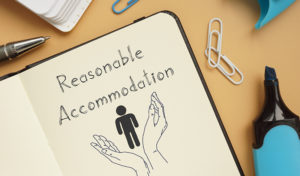Whether you are a board member, an HOA manager, or a homeowner, it is essential to understand the legal requirements placed upon HOAs. Here’s what you need to know about your HOA and ADA compliance.
Understanding HOA and ADA Compliance
Serving on the HOA board can be a rewarding experience. You get to make meaningful contributions and make the community a better place for everyone. But, as a board member, you also make decisions for the association. And those decisions can sometimes land you or the HOA in hot water.
Homeowners associations are not immune to liability. It comes with the territory. Lawsuits — or even just the threat of one — can be costly. If a court finds the HOA liable, it can result in costly damages. And owners can sue their HOA for just about anything.
One of the most common grounds for legal action is a violation of federal or state protections. The Americans With Disabilities Act, in particular, has long been a point of interest among HOA communities.
What Is the Americans With Disabilities Act?
 The Americans with Disabilities Act, or ADA for short, is a federal law designed to protect the rights of individuals with disabilities. It ensures that entities provide equal opportunities to persons with disabilities.
The Americans with Disabilities Act, or ADA for short, is a federal law designed to protect the rights of individuals with disabilities. It ensures that entities provide equal opportunities to persons with disabilities.
The law applies to state and local governments, educational institutions, public transportation providers, commercial facilities, telecommunications providers, employers with at least 15 employees, and places open to the general public. It was signed into law in 1990 by President George H. W. Bush.
Does My HOA Have to Comply With ADA?
It is not uncommon for a person with a disability to claim that their HOA failed to provide reasonable accommodation, often resulting in complaints and legal actions. But, does the ADA even apply to HOAs in the first place? Here’s what HOA owners and managers need to know about ADA.
The Americans With Disabilities Act does cover state and local governments, commercial facilities, and employers with a minimum of 15 employees, among other entities. However, it does not explicitly name homeowners associations. That said, the ADA does also apply to places of public accommodation.
What does this mean? Places of public accommodation are any places that are open to the general public, whether a public or private entity owns the places. By that logic, the ADA does apply to homeowners associations that operate as a public accommodation. Outside of that, though, the HOA is not subject to the requirements and regulations of the ADA.
What Counts as a Public Accommodation?
A public accommodation is simply any space or facility that the HOA operates for use by the general public and not exclusively for use by the residents and their guests. It is important to distinguish between “guest” and “general public.” Just because a resident invites a guest to use an HOA facility does not automatically mean that the facility is a public accommodation.
There are, of course, exceptions to this. An HOA may need to comply with ADA requirements if:
- The HOA permits members of the general public to purchase memberships or passes to the facilities of the association;
- The HOA permits schools, clubs, or church groups to use the facilities of the association regularly; and/or,
- An association maintains a rental property on the premises that regularly welcomes visits from the general public.
There have also been cases where an HOA had to comply with ADA regulations for operating a commercial space. If your HOA does any of these things, you must examine your facilities and ensure you comply with ADA requirements. Failure to comply with the requirements of the ADA can result in serious penalties. If you don’t comply with the requirements, consider halting such practices and activities until you meet the standards of the ADA.
HOA and ADA Compliance Sample Scenarios
Broadly speaking, the ADA applies to HOA facilities, amenities, and spaces that are not exclusively open to the association’s members, residents, and guests. If an HOA operates a public accommodation, it must ensure compliance with ADA requirements. If it fails to do so, individuals may claim discrimination and bring legal action against the association.
But what are some sample scenarios where an HOA would need to comply with ADA?
 The association regularly allows clubs, churches, and schools to use the HOA’s clubhouse for meetings or events.
The association regularly allows clubs, churches, and schools to use the HOA’s clubhouse for meetings or events.- The association regularly allows public meetings at the HOA’s clubhouse.
- An HOA rents out an office to a lawyer, dentist, or notary public (among other professions) that the general public regularly visits.
- The association permits the use of common area courts for tennis practices or meets that the general public can also attend.
- The association permits using common area pools for swim practices and meets that members of the general public can also attend.
- An HOA opens its walking trails, golf courses, and playgrounds to the general public.
- The association sells membership passes to the general public that would allow them to use the pool or gym.
- The association operates a parking lot that is open to guest parking.
Of course, real-life cases are not limited to these sample scenarios. Other circumstances would call for ADA compliance. Even opening a facility or amenity to the public part-time would require the HOA to comply with ADA regulations, and HOA boards are not always well-versed with the law and its many requirements. As such, associations would be wise to seek the help of an attorney before opening facilities to members of the general public.
HOA and ADA Compliance: The Bottom Line
Homeowners associations are not perfect entities; they are managed by people who can make mistakes. Therefore, there is always a possibility that an HOA would miss something when trying to comply with the law. To minimize such risks, hiring a lawyer to assist the association with management is a good idea.
Clark Simson Miller provides HOA management services to homeowners associations. Call us today at 865.315.7505 or contact us online to learn more!
RELATED ARTICLES:
- What Does Fair Housing Mean For Your HOA Community?
- Federal Laws That Regulate HOA Communities
- Is Smoking In A Homeowners Association Community Allowed?


 The association regularly allows clubs, churches, and schools to use the HOA’s clubhouse for meetings or events.
The association regularly allows clubs, churches, and schools to use the HOA’s clubhouse for meetings or events.